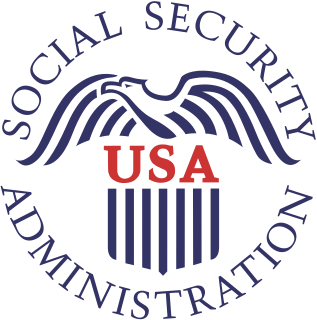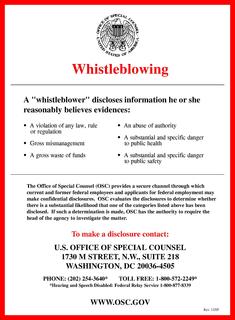
The Antarctic Treaty and related agreements, collectively known as the Antarctic Treaty System (ATS), regulate international relations with respect to Antarctica, Earth's only continent without a native human population. For the purposes of the treaty system, Antarctica is defined as all of the land and ice shelves south of 60°S latitude. The treaty entered into force in 1961 and currently has 54 parties. The treaty sets aside Antarctica as a scientific preserve, establishes freedom of scientific investigation, and bans military activity on the continent. The treaty was the first arms control agreement established during the Cold War. Since September 2004, the Antarctic Treaty Secretariat headquarters has been located in Buenos Aires, Argentina.
In the United States, Social Security is the commonly used term for the federal Old-Age, Survivors, and Disability Insurance (OASDI) program and is administered by the Social Security Administration. The original Social Security Act was signed into law by President Franklin D. Roosevelt in 1935, and the current version of the Act, as amended, encompasses several social welfare and social insurance programs.
Supplemental Security Income (SSI) is a United States means-tested federal welfare program that provides cash assistance to individuals residing in the United States who are either aged 65 or older, blind, or disabled. SSI was created by the Social Security Amendments of 1972 and is incorporated in Title 16 of the Social Security Act. The program began operations in 1974.

The United Nations System consists of the United Nations, and the six principal organs of the United Nations: the General Assembly, Security Council, Economic and Social Council (ECOSOC), Trusteeship Council, International Court of Justice (ICJ), and the UN Secretariat, specialized agencies, and affiliated organizations. The executive heads of some of the United Nations System organizations and the World Trade Organization, which is not formally part of the United Nations System, have seats on the United Nations System Chief Executives' Board for Coordination (CEB). This body, chaired by the Secretary-General of the United Nations, meets twice a year to co-ordinate the work of the organizations of the United Nations System.

The United States Social Security Administration (SSA) is an independent agency of the U.S. federal government that administers Social Security, a social insurance program consisting of retirement, disability, and survivors benefits. To qualify for most of these benefits, most workers pay Social Security taxes on their earnings; the claimant's benefits are based on the wage earner's contributions. Otherwise benefits such as Supplemental Security Income (SSI) are given based on need.
Collective bargaining is a process of negotiation between employers and a group of employees aimed at agreements to regulate working salaries, working conditions, benefits, and other aspects of workers' compensation and rights for workers. The interests of the employees are commonly presented by representatives of a trade union to which the employees belong. The collective agreements reached by these negotiations usually set out wage scales, working hours, training, health and safety, overtime, grievance mechanisms, and rights to participate in workplace or company affairs.
Employment is a relationship between two parties, usually based on a contract where work is paid for, where one party, which may be a corporation, for profit, not-for-profit organization, co-operative or other entity is the employer and the other is the employee. Employees work in return for payment, which may be in the form of an hourly wage, by piecework or an annual salary, depending on the type of work an employee does or which sector they are working in. Employees in some fields or sectors may receive gratuities, bonus payment or stock options. In some types of employment, employees may receive benefits in addition to payment. Benefits can include health insurance, housing, disability insurance or use of a gym. Employment is typically governed by employment laws, organisation or legal contracts.
In international economic relations and international politics, most favoured nation (MFN) is a status or level of treatment accorded by one state to another in international trade. The term means the country which is the recipient of this treatment must nominally receive equal trade advantages as the "most favoured nation" by the country granting such treatment. In effect, a country that has been accorded MFN status may not be treated less advantageously than any other country with MFN status by the promising country. There is a debate in legal circles whether MFN clauses in bilateral investment treaties include only substantive rules or also procedural protections. The members of the World Trade Organization (WTO) agree to accord MFN status to each other. Exceptions allow for preferential treatment of developing countries, regional free trade areas and customs unions. Together with the principle of national treatment, MFN is one of the cornerstones of WTO trade law.
A yellow-dog contract is an agreement between an employer and an employee in which the employee agrees, as a condition of employment, not to be a member of a labor union. In the United States, such contracts were, until the 1930s, widely used by employers to prevent the formation of unions, most often by permitting employers to take legal action against union organizers. In 1932, yellow-dog contracts were outlawed in the United States under the Norris-LaGuardia Act.

The United States Public Health Service Commissioned Corps (PHSCC), also referred to as the Commissioned Corps of the United States Public Health Service, is the federal uniformed service of the U.S. Public Health Service (PHS), and is one of the eight uniformed services of the United States. The commissioned corps' primary mission is to the protection, promotion, and advancement of health and safety of the general public.
The Job Training Partnership Act of 1982 was a United States federal law passed October 13, 1982, by Congress with regulations promulgated by the United States Department of Labor during the Ronald Reagan administration. The law was the successor to the previous federal job training legislation, the Comprehensive Employment and Training Act (CETA). It was repealed by the Workforce Investment Act of 1998 during the administration of President Bill Clinton.
Per diem or daily allowance is a specific amount of money an organization gives an individual, often an employee, per day to cover living expenses when traveling for work.
A permatemp is a temporary employee who works for an extended period for a single staffing client. The word is a portmanteau of the words permanent and temporary.
Human rights in the Philippines pertains to the concept, practice of human rights within the Philippine archipelago. The concept of "human rights," in the context of the Philippines, pertains mainly to the civil and political rights of a person living in the Philippines by reason of the 1987 Philippines Constitution. Human rights are a justified set of claims that set moral standards to members of the human race, not exclusive to a specific community or citizenship. Membership in the human race is the sole qualification to obtain these rights. Human rights, unlike area-specific conventions of international laws, are universally justifiable as it pertains to the entire human race, regardless of geographical location.
A severance package is pay and benefits employees may be entitled to receive when they leave employment at a company unwillfully. In the US, there is no requirement in the Fair Labor Standards Act (FLSA) for severance pay. Severance pay is a matter of agreement between an employer and an employee. In addition to their remaining regular pay, it may include some of the following:
Social Security Disability Insurance is a payroll tax-funded federal insurance program of the United States government. It is managed by the Social Security Administration and designed to provide income supplements to people who are physically restricted in their ability to be employed because of a notable disability. SSD can be supplied on either a temporary or permanent basis, usually directly correlated to whether the person's disability is temporary or permanent.

The Convention on the Rights of Persons with Disabilities is an international human rights treaty of the United Nations intended to protect the rights and dignity of people with disabilities. Parties to the Convention are required to promote, protect, and ensure the full enjoyment of human rights by people with disabilities and ensure that they enjoy full equality under the law. The Convention has served as the major catalyst in the global movement from viewing people with disabilities as objects of charity, medical treatment and social protection towards viewing them as full and equal members of society, with human rights. It is also the only UN human rights instrument with an explicit sustainable development dimension. The Convention was the first human rights treaty of the twenty-first century.

In the United States, a Social Security number (SSN) is a nine-digit number issued to U.S. citizens, permanent residents, and temporary (working) residents under section 205(c)(2) of the Social Security Act, codified as 42 U.S.C. § 405(c)(2). The number is issued to an individual by the Social Security Administration, an independent agency of the United States government. Although the original purpose for the number was for the Social Security Administration to track individuals, the Social Security number has become a de facto national identification number for taxation and other purposes.
National Nurses United (NNU) is the largest organization of registered nurses in the United States. The NNU, with close to 185,000 members across the country, is the most far-reaching union and professional association of registered nurses in the U.S. Founded in 2009 through the merging of the California Nurses Association/National Nurses Organizing Committee, the United American Nurses, and the Massachusetts Nurses Association, the NNU focuses on amplifying the voice of direct care RNs and patients in national policy. The union's policy positions include the enactment of safe nurse to patient ratios, patient advocacy rights at the Executive and State level, and fighting for single-payer health care to secure "quality healthcare for all, as a human right." The organization's goal is to "organize all direct care RNs into a single organization capable of exercising influence over the healthcare industry, governments, and employers."

A whistleblower is a person who exposes any kind of information or activity that is deemed illegal, unethical, or not correct within an organization that is either private or public. The Whistleblower Protection Act was made into federal law in the United States in 1989.






